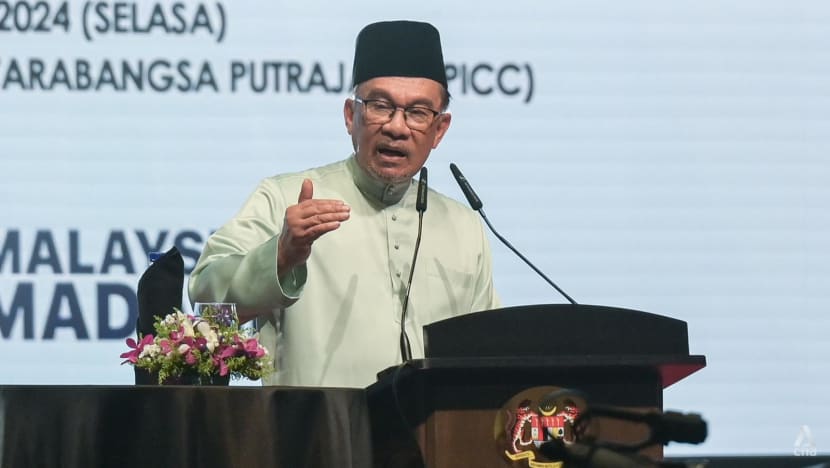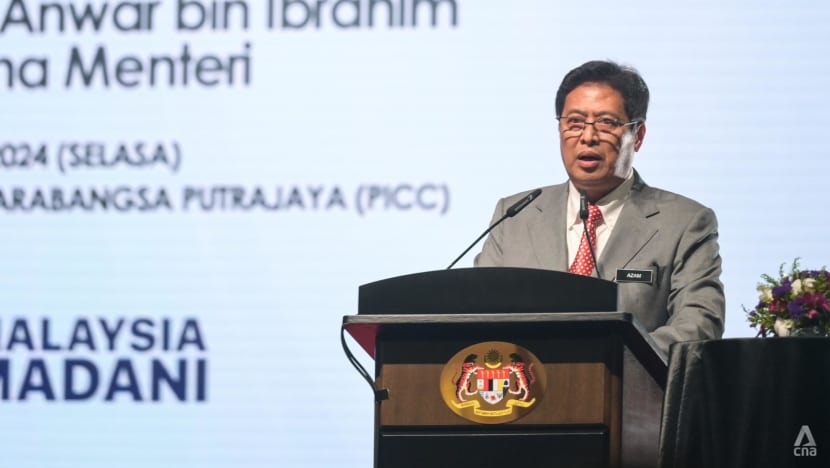Malaysia unveils financial incentives for anti-graft whistleblowers amid country’s RM277b loss to corruption
The government implemented 85 out of 111 initiatives in its previous national anti-corruption plan, which covered similar risk areas such as political governance and public procurement, to a new anti-graft initiative announced on May 7.

Malaysia Prime Minister Anwar Ibrahim speaking at the launch of the new national anti-corruption strategy in Putrajaya on May 7, 2024. (File Photo: CNA/Fadza Ishak)

This audio is generated by an AI tool.
KUALA LUMPUR: Malaysia has unveiled a new national anti-corruption strategy, which Prime Minister Anwar Ibrahim has said will involve financial incentives for members of the public who help the government in their anti-graft crackdown.
Such financial incentives are already currently offered to civil servants.
“In executing this strategy, we give money to officers, civil servants or even members of the public who cooperate," Mr Anwar said at the announcement of the new initiative on Tuesday (May 7).
This comes following the country’s staggering losses of RM277 billion (US$58.4 billion) to corruption over the past five years, the chief commissioner of the Malaysian Anti-Corruption Commission (MACC) said in a speech.
Mr Azam Baki said the RM277 billion estimate was based on the country’s cumulative gross domestic product from 2018 to 2023.
He did not specify how the RM277 billion figure was calculated. Malaysia’s annual GDP is approximately US$407 billion, according to the World Bank.
The loss comes even as the country implemented more than two-thirds of initiatives in its previous national anti-corruption plan, Mr Azam said.
“This enormous figure could have been used to help people in many aspects, especially in social projects like revamping hospitals and schools,” he said at the Putrajaya International Convention Centre at about 11am on Tuesday.
“Therefore, to ensure the anti-corruption strategy really makes an impact, the (new) strategy was drafted using various methods to identify areas that are vulnerable to the latest risks of corruption.”
The new strategy, which covers similar risk areas like political governance and public procurement to the previous plan, puts more emphasis on a collective responsibility to fight corruption, including education in schools on the importance of eradicating graft.
Malaysia is ranked 57th out of 180 countries in Transparency International’s corruption perceptions index for 2023, although this is an improvement from 61st in 2022, the first uptick since a consistent slide from 2019.
The country lost an estimated US$4.5 billion in the 1Malaysia Development Berhad (1MDB) scandal, which led to the imprisonment of former prime minister Najib Razak for corruption offences in 2022.

Mr Anwar, who also attended the launch, said all the money lost to corruption could have been used to improve people’s livelihoods if the country was saved from “greedy” people in power.
The MACC is in the midst of an ongoing corruption crackdown on prominent businessmen and former politicians that critics have labelled as politically motivated, as they involve Mr Anwar’s political rivals in the late 1990s.
Those being investigated include former prime minister Mahathir Mohamad as well as businessmen close to former finance minister Daim Zainuddin, who has been charged with failing to declare his assets.
The premier has dismissed allegations of political payback and on Tuesday he congratulated the MACC for remaining steadfast in its efforts to probe high-profile people suspected to have abused their power.
“The scourge of corruption cannot be taken lightly,” said Mr Anwar. “To combat this, you need a very powerful, committed, dedicated and courageous force. You need strong legislation and norms.”
FINANCIAL CARROT
Mr Azam said the new national anti-corruption strategy emphasises integrity, transparency and accountability in areas like politics, public administration, government procurement, law enforcement and judiciary.
It has five main categories - education, public accountability, the people’s voice, enforcement, and incentives - comprising 60 sub-categories that are targeted to be carried out from 2024 to 2028.
Local news channel TV3 reported in March that between 2012 and 2023, more than RM1 million had been given as incentives to civil servants who reported corruption offences or gave related information.
According to established guidelines, civil servants who report the offence will get an incentive equivalent to the amount they were offered as bribes, if the case is investigated and results in prosecution and conviction.
It was not immediately clear how the government plans to extend this scheme to the general public.

The new strategy was also benchmarked against other developed nations, like the UK’s anti-corruption strategy 2017-2022, to ensure it is compatible with the current government’s basis, Mr Azam said.
“The challenges of fighting corruption in a world without borders that is becoming more complex are far more different from the approach that was taken a few decades ago,” he said.
Malaysia’s previous national anti-corruption plan, launched under the second Mahathir administration and executed from 2019 to 2023, had five main strategies covering similar areas, but without elements involving the general public.
Mr Azam said the government had successfully implemented 85 out of 111 initiatives in the old plan, an achievement rate of about 77 per cent.
“Looking back at the successful execution of the national anti-corruption plan, in 2020 it was identified as one factor that helped Malaysia improve its reputation in the 2019 corruption perceptions index,” he added.
“The benefits and effectiveness of this national anti-corruption strategy depends on the highest commitment from all stakeholders.”
Mr Anwar stressed that everyone, not just the MACC or the government, had a responsibility to fight corruption and save the country.
“Every time action is taken (against high-profile individuals), many complain and sigh. Some even defend them and give excuses: ‘Enough already. Don’t take revenge, they are already old,’” he said, in an apparent reference to the MACC’s ongoing probes.
“I congratulate and salute those who take action against them.”
















